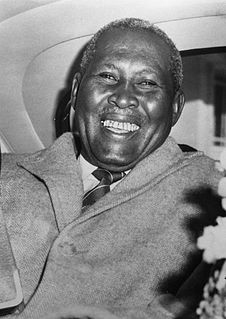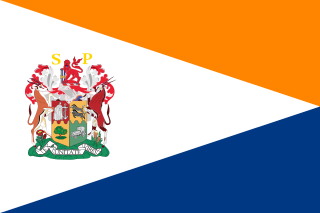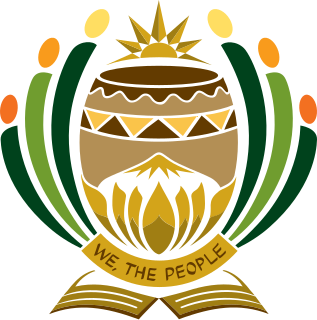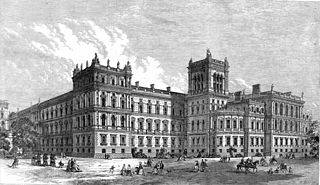Related Research Articles

South Africa is divided into nine provinces. On the eve of the 1994 general election, South Africa's former homelands, also known as Bantustans, were reintegrated, and the four existing provinces were divided into nine. The twelfth, thirteenth and sixteenth amendments to the Constitution of South Africa changed the borders of seven of the provinces.

Coloureds refers to members of multiracial ethnic communities in Southern Africa who may have ancestry from more than one of the various populations inhabiting the region, including African, Asian, as well as European. South Africa's Coloured people are regarded as having some of the most diverse genetic background. Because of the vast combination of genetics, different families and individuals within a family may have a variety of different physical features.

Inkosi Albert John Luthuli, also known by his Zulu name Mvumbi, was a South African teacher, activist, Nobel Peace Prize winner, and politician. In 1952, Luthuli was elected president of the African National Congress (ANC), at the time an umbrella organisation leading opposition to the white minority government in South Africa. Luthuli ended up serving until his accidental death. He was awarded the 1960 Nobel Peace Prize for his role in the non-violent struggle against apartheid. He was the first person of African heritage to be awarded the Nobel Peace Prize. Luthuli was a lay preacher of the United Congregational Church of Southern Africa (UCCSA) based at its Groutville Congregational Church in Stanger, KwaZulu-Natal, where Luthuli was laid to rest upon his death in 1967.
The overseas departments and regions of France are departments of France that are outside metropolitan France, the European part of France. They have exactly the same status as mainland France's regions and departments. The French Constitution provides that, in general, French laws and regulations apply to French overseas regions the same as in metropolitan France, but can be adapted as needed to suit the region's particular needs. Hence, the local administrations of French overseas regions cannot themselves pass new laws.
Tricameralism is the practice of having three legislative or parliamentary chambers. It is contrasted with unicameralism and bicameralism, each of which is far more common.

The State President of the Republic of South Africa was the head of state of South Africa from 1961 to 1994. The office was established when the country became a republic on 31 May 1961, albeit, outside the Commonwealth of Nations, and Queen Elizabeth II ceased to be Queen of South Africa. The position of Governor-General of South Africa was accordingly abolished. From 1961 to 1984, the post was largely ceremonial. After constitutional reforms enacted in 1983 and taking effect in 1984, the State President became an executive post, and its holder was both head of state and head of government.

The Parliament of the Republic of South Africa is South Africa's legislature; under the present Constitution of South Africa, the bicameral Parliament comprises a National Assembly and a National Council of Provinces. The current twenty-seventh Parliament was first convened on 22 May 2019.
Elections in South Africa are held for the National Assembly, provincial legislatures and municipal councils. Elections follow a five-year cycle, with national and provincial elections held simultaneously and municipal elections held two years later. The electoral system is based on party-list proportional representation, which means that parties are represented in proportion to their electoral support. For municipal councils there is a mixed-member system in which wards elect individual councillors alongside those named from party lists.

The Republic of South Africa is a parliamentary republic with three-tier system of government and an independent judiciary, operating in a parliamentary system. Legislative authority is held by the Parliament of South Africa.

Apartheid was a system of institutionalised racial oppression that existed in South Africa and South West Africa from 1948 to the early 1990s. This system denied non-white South Africans civil rights, such as the right to vote. Apartheid was characterized by an authoritarian political culture based on baasskap, which ensured that South Africa was dominated politically, socially, and economically by the nation's minority white population. According to this system of social stratification, white citizens had the highest status, followed by Indians and Coloureds, then black Africans. The economic legacy and social effects of apartheid continue to the present day.

The India Office was a British government department established in London in 1858 to oversee the administration, through a Viceroy and other officials, of the Provinces of India. These territories comprised most of the modern-day nations of Indian Subcontinent as well as Yemen and other territories around the Indian Ocean. The department was headed by the Secretary of State for India, a member of the British cabinet, who was formally advised by the Council of India.
The Department of Science and Innovation is the South African government department responsible for scientific research, including space programmes. The current Minister is Blade Nzimande.

The Tricameral Parliament, officially the Parliament of the Republic of South Africa, was the legislature of South Africa between 1984 to 1994, established by the South African Constitution of 1983, which gave a limited political voice to the country's Coloured and Indian population groups. The majority Black population group was however still excluded, their interests notionally represented in the governments of the black homelands, or "bantustans", of which they were formally citizens. As these institutions were largely politically impotent, its principal effect was to further entrench the political power of the White section of the South African population.

A referendum on a new constitution was held in South Africa on 2 November 1983 in which the white population was given the opportunity to approve or reject the Constitution of 1983. This constitution introduced the Tricameral Parliament, in which coloured and Indian South Africans would be represented in separate parliamentary chambers, while black South Africans would remain unrepresented. The referendum passed with 66.3% of voters voting "Yes"; consequently the new constitution came into force on 3 September 1984.

Indian South Africans are South Africans who descend from indentured labourers and free migrants who arrived from British India during the late 1800s and early 1900s. The majority live in and around the city of Durban, making it one of the largest "Indian" populated cities outside of India.

The Colony and Protectorate of Kenya, commonly known as British Kenya or British East Africa, was part of the British Empire in Africa. It was established when the former East Africa Protectorate was transformed into a British Crown colony in 1920. Technically, the "Colony of Kenya" referred to the interior lands, while a 16 km (10 mi) coastal strip, nominally on lease from the Sultan of Zanzibar, was the "Protectorate of Kenya", but the two were controlled as a single administrative unit. The colony came to an end in 1963 when a black majority government was elected for the first time and eventually declared independence as Kenya.
The House of Delegates was a body in the Tricameral Parliament of South Africa which existed from 1984 to 1994. It was reserved for Indian South Africans. The body was elected twice; in 1984 and 1989. It was the second time in South Africa's history that Indians had ever had any sort of representation at the national level, the first being the South African Indian Council. It was originally to be called the Chamber of Deputies.
The Coloured vote constitutional crisis, also known as the Coloured vote case, was a constitutional crisis that occurred in the Union of South Africa during the 1950s as the result of an attempt by the Nationalist government to remove coloured voters in the Union's Cape Province from the common voters' rolls. It developed into a dispute between the judiciary and the other branches of government over the power of Parliament to amend an entrenched clause in the South Africa Act and the power of the Appellate Division to overturn the amendment as unconstitutional. The crisis ended when the government enlarged the Senate and altered its method of election, allowing the amendment to be successfully enacted.
The New Year Honours 1911 were appointments by King George V to various orders and honours to reward and highlight good works by members of the British Empire. They were announced on 3 January 1911.
Solidarity was a political party created in the lead-up to the 1984 South African general election, which determined the makeup of the first House of Delegates, the body within the Apartheid Tricameral Parliament reserved for Indian South Africans. It took its name from the Polish trade union.p. 40 Its first leader was JN Reddy, an influential banker and businessman with a number of company directorships. To be able to lead the party, Reddy relinquished some of his business interests. Another important party member was Pat Poovalingam, the chairman of weekly newspaper "The Graphic". Solidarity appealed more to South Africans with Southern Indian roots, while Amichand Rajbansi's National People's Party appealed more to those with a North Indian heritage.